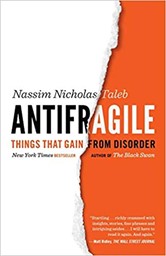Review by Myra Salzer
 Pandemics are good for readers, and present the opportunity for non-readers to become readers. That’s me! And the fact that I’ve become more of a reader is the quintessential example of how antifragility works. You see, the whole premise behind Nassim Nicholas Taleb’s book, Antifragile, is that when systems get mildly upset, they can adapt and become stronger. That is the definition of antifragile.
Pandemics are good for readers, and present the opportunity for non-readers to become readers. That’s me! And the fact that I’ve become more of a reader is the quintessential example of how antifragility works. You see, the whole premise behind Nassim Nicholas Taleb’s book, Antifragile, is that when systems get mildly upset, they can adapt and become stronger. That is the definition of antifragile.
You may be aware of the book The Black Swan. Same author. Same erudite arrogance. And, in my humble opinion, Taleb earns his arrogance. His vocabulary is amazing. There probably wasn’t one paragraph in the entire book that didn’t have me looking up the definition of some word. He is a polymath and can evoke literature, history, politics, medicine, finance, business, innovation, human interaction, physical development, etc. – and he can give examples of how anti-fragility works in each of these realms.
Here are some examples of how anti-fragility works and doesn’t work:
If you don’t stress your body, it will come fragile. However, if you push it, past the sore muscles, you will build strength. Similarly, vaccines work by stressing your body so it can develop antibodies. It’s like training your body to be a little sick so that it doesn’t get extremely sick. In other words, training it to be antifragile.
I think a case could be made for the book’s application to parenting, when there are ample financial resources that can soften the stressors of a child of wealth. This might be fragilizing to the child, making him less resilient to thrive, grow, strengthen, endure, and be a well-rounded, developed individual.
Taleb explains how our financial system is making us fragile. That central banks are providing easy money instead of allowing some businesses to fail and some industries to adjust to changing times. The inevitable result will be that the systems will fail catastrophically. They will break and not be able to come back stronger than before. We are in a period where, even with COVID, we have access to the government’s printing presses. At some point, as TWC’s Steve Henningsen has been saying for years now, there will have to be a restructuring; we will break, unless by some miracle, systems can realign to make us antifragile. From the book, “It is quite perplexing that those from whom we have benefited the most aren’t those who have tried to help us (say with “advice”) [or bailouts] but rather those who have actively tried – but eventually failed – to harm us.”
And another quote: “Consider this in terms of economic and institutional life. If nature ran the economy, it would not continuously bail out its living members to make them live forever. Nor would it have permanent administrations and forecasting departments that try to outsmart the future – it would not let the scam artists of the United States Office of Management and Budget make such mistakes of systemic arrogance.”
In many small ways, I find myself applying the concept of anti-fragility to my life ever since I finished the book. I try to walk barefoot on uneven surfaces, and I never miss a workout without starting on my slack line. I finish my showers with 30 seconds of cold water. I go without eating for stretches of time. And, most fun of all, I read new books that I never would have picked up before the pandemic. It’s helping me grow, become stronger and dare I say – antifragile?